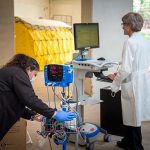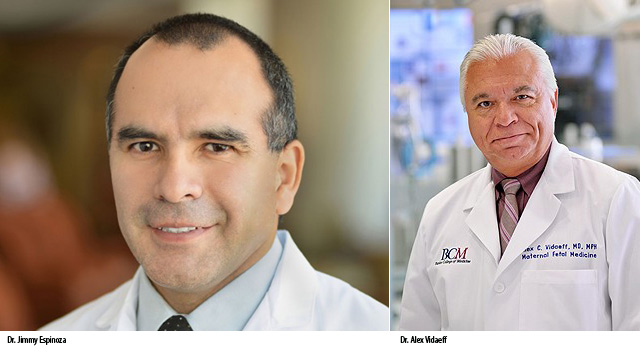When Kirsti Clifford found out she was pregnant with her second child, she was excited beyond belief. She was grateful to be giving her daughter a sibling and she was looking forward to pregnancy and delivery more so than with her first child because she knew what to expect. Then the pandemic happened and Clifford’s anxiety rose right along with it.
“There is so much unknown.” Clifford said. “I have felt much more uneasy this time and am trying to be really careful. I am limiting my exposure, social distancing and not going out unless I have to.”
To reduce the anxiety of expectant moms like Clifford, and to lower their risk of COVID-19 exposure and infection, Texas Children’s Pavilion for Women has opened a drive-through prenatal clinic at our Medical Center Campus.
A group of Texas Children’s obstetrics and gynecology physicians in consultation with the American College of Obstetrician Gynecologists (ACOG) came up with the idea while discussing how to adequately care for pregnant mothers while reducing their risk of contracting COVID-19 while traveling to hospitals or clinics for a prenatal exam.
“Providing access to prenatal health care while limiting exposure of both obstetric health care professionals and patients to COVID-19 is challenging,” said Dr. Mark Turrentine, a Texas Children’s obstetrician and gynecologist. “Although reductions in the frequency of prenatal visits and implementation of telehealth interventions provide some options, there still remains a need for patient–health care professional visits.”
The drive-through prenatal care clinic at Texas Children’s allows pregnant women who do not need to be seen in the clinic to remain in their vehicles while being assessed by a health care professional, thus reducing potential patient, health care professional, and staff exposure to COVID-19.
View photos of the drive-through clinic below.
The drive-through visits include key elements of a prenatal exam such as blood pressure measurements for evaluation for hypertensive disorders of pregnancy, fetal heart rate assessment, and selected ultrasound-based measurements or observations, as well as face-to-face patient–health care professional interaction.
“Patients using the drive-through clinic feel reassured that they can actually see a health care provider and hear their baby’s heartbeat without having to come into our facility and risk being exposed to the virus,” Turrentine said. “Our providers like it as well. They enjoy being able to provide patients with an option that might better suit their needs during these unprecedented times.”
Clifford said she used the drive-through clinic at the Medical Center Campus for her 30-week appointment because she didn’t want to take any unnecessary risks, and that it turned out to be a great decision. She said she got her blood pressure taken and that, more importantly, she got to hear her baby’s heartbeat.
“I appreciated the setup because we can still get some of the important monitoring that we need to feel reassured,” Clifford said. “It’s a creative solution that I would opt to use again.”
In conjunction with Turrentine and other Texas Children’s obstetrics and gynecology physician, Obstetrician and Gynecologist-in-Chief Dr. Michael A. Belfort recently published a paper about the drive-through prenatal clinic in Obstetrics & Gynecology, the official publication of ACOG. In that paper, Belfort said the drive-through model is projected to reduce the number of in-person clinic visits by 33 percent per patient compared with the traditional prenatal care paradigm, using equipment and supplies that most obstetric clinics in the United States can access.
“What we have seen so far at Texas Children’s is that the concept of a drive-through prenatal clinic works,” Belfort said. “They are reducing patient anxiety without compromising quality of care. It’s a win-win for everyone involved.”
Texas Children’s is also using drive-through capabilities for a variety of services including per-operative COVID-19 testing at all three of our hospital campuses and will expand these options as we continue to refine how we care for our patients.






